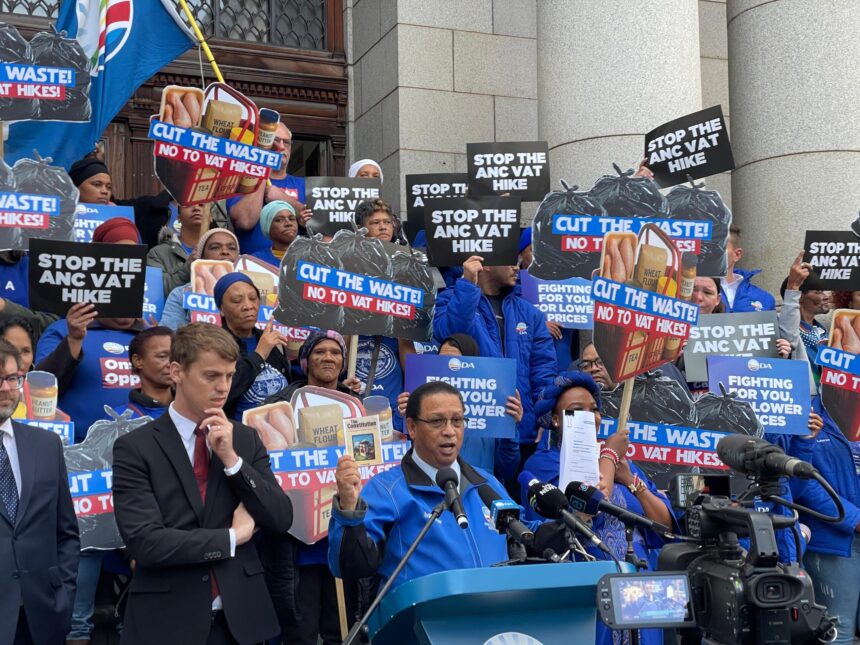The ongoing court case between the Economic Freedom Fighters (EFF), the Democratic Alliance (DA), and the African National Congress (ANC) has brought to light allegations of deception and manipulation in the passing of the fiscal framework through parliament. The case centers around Finance Minister Enoch Godongwana’s decision to increase VAT, a move that has faced opposition from both the EFF and the DA.
Advocate Tembeka Ngcukaitobi, representing the EFF, argued in court that the ANC used deception to push through the fiscal framework, claiming that the minister had no intention of reconsidering the VAT increase despite earlier recommendations. He accused the minister of misleading MPs into voting in favor of the framework by falsely suggesting that alternative revenue sources would be explored.
In response, Godongwana defended his decision to increase VAT, stating that it was necessary to raise additional revenue for social services. He argued that the decision was final and could not be blocked by the court, as it had already been approved by a parliamentary majority. However, Ngcukaitobi contended that the minister’s actions amounted to deception and undermined the integrity of the budgetary process.
The DA joined the court case shortly after the fiscal framework was approved by parliament, seeking to suspend the VAT increase and have the framework reconsidered by the finance committees. The party argued that MPs were misled into believing they could prevent the VAT hike from taking effect, leading to a material error in the adoption of the framework.
Both the DA and the EFF maintained that MPs only had two options when it came to the Money Bills and Related Matters Act – either adopt the framework or amend it. They claimed that the inclusion of a non-binding recommendation in the final report was misleading and irregular, as it gave a false sense of control over the VAT increase.
As the court case unfolds, the allegations of deception and manipulation in the passing of the fiscal framework have raised concerns about the integrity of the parliamentary process. The outcome of the case will have significant implications for the future of tax policy in South Africa and the accountability of government officials. The central issue that committee members were uncertain about was the agreement reached at a lengthy finance committee meeting. The DA expressed astonishment that the issue was not put to a vote, leading to confusion and uncertainty among members. Instead, draft versions of the report were hastily circulated after the meeting, with acceptance of the framework written into the document.
The DA argued that this process was unlawful and irrational, rendering the decisions by the National Assembly and the National Council of Provinces to approve the fiscal framework also unlawful. The EFF supported the DA’s application, stating that the validity of the fiscal framework depended on the validity of the report to the National Assembly. Therefore, they argued that if the report was suspended, the budget and fiscal framework would also be suspended, halting the VAT increase.
Both parties contended that irreversible harm would occur if the court did not intervene to stop the tax hike. The DA sought an interim order to prevent the increase, citing the impossibility of reversing its effects. Additionally, the DA requested the court to declare section 7(4) of the Value Added Tax Act unconstitutional, as it granted the finance minister the authority to impose tax increases without full parliamentary approval.
The DA argued that the power to impose taxes rests solely with the legislature, not the minister, and delegation is only permissible for regulations, not taxation. They claimed that the unguided and unconstrained power granted to the minister in s 7(4) was unconstitutional, as it essentially allowed the minister to amend the VAT Act itself.
The case is expected to face judicial caution regarding the judiciary’s interference in executive matters. However, Ngucaitobi reassured the court that a decision being polycentric does not exempt it from judicial review. He also highlighted that the finance ministry’s proposal to shield the poor from the VAT increase by expanding zero-rated items was meaningless, as the commission to evaluate this proposal had not yet been appointed.
In conclusion, the legal battle over the VAT increase and the constitutionality of section 7(4) of the VAT Act continues to unfold, with both the DA and the EFF advocating for parliamentary oversight and accountability in tax matters.








